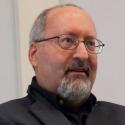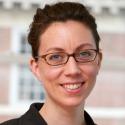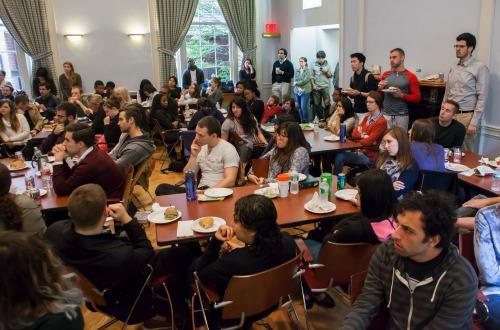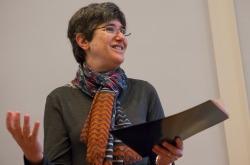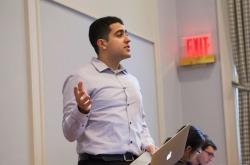In Pursuit of Change
Columbia Law School Professors Talk to Students About How to Use Their Legal Training to Effect Change in the World
New York, October 23, 2014—Students can make a difference in the world by putting their passion and problem-solving skills to work in any career they pursue, Columbia Law School Dean Robert E. Scott told a standing-room only crowd at a student-faculty workshop series event on Oct. 13.
“You can be of great value starting right now,” said Scott, the Alfred McCormack Professor of Law.
Dean Scott spoke at a panel discussion about how to use a legal education to create change in the world. The event was part of an an ongoing student-faculty workshop series called “Lawyering for Change in a Changing World.” Scott was joined by fellow Columbia Law School professors Mark Barenberg, Kimberlé Williams Crenshaw, and Sarah Knuckey.
| (left to right) Professors Mark Barenberg, Kimberlé Williams Crenshaw, and Sarah Knuckey joined Dean Robert E. Scott in a lively discussion with students about how to advocate for change. |
Hosted by Susan Sturm, the George M. Jaffin Professor of Law and Social Responsibility, and the Student Public Interest Network and its co-chairs Paul Chander ’15 and Kirby B. Tyrrell ’16, the event featured a Q&A with audience members who packed into the Jerome Greene Annex to hear the professors’ perspectives on advocating for change in their respective fields.
“There’s no one theory or approach to change,” said Knuckey, the Lieff Cabraser Heimann & Bernstein Clinical Associate Professor of Human Rights, director of the Human Rights Clinic, and faculty co-director of the Human Rights Institute. “The approach is designed in the context of a specific problem.”
Each of the faculty highlighted his or her scholarship as it relates to advocacy creating change in a field or industry. For example:
- Barenberg, a labor and employment law expert, mentioned some of his ongoing efforts to advocate for workers’ rights both in the U.S. and abroad;
- Crenshaw talked about her work raising awareness of intersectionality, a term she coined to encapsulate the unique discrimination women of color face based on gender and race
- Knuckey talked about new projects students are involved in, including with the United Nations and studying environmental risks in Papua New Guinea; and
- Scott, a nationally-recognized authority in the fields of contracts, commercial law, and bankruptcy, described his research into new and innovative ways transactional attorneys are designing contracts to facilitate productive business relationships.
| Students packed into the Jerome Greene Annex to hear the professors talk about their work and experiences. |
The professors encouraged students to pursue their existing interests even as they explore the myriad opportunities available to them on campus, to seek out faculty mentors, and to continue to work in the public interest no matter where their career takes them.
“Find ways to stay connected to your passion,” Crenshaw said in response to a student who asked about how to make time for public interest work in a firm setting. “It doesn’t have to be a harsh dichotomy—you can nurture these things even as you are doing that work.”
Barenberg, Isidor and Seville Sulzbacher Professor of Law, agreed.
“Keep your mind open,” he said. “Don’t narrow yourself too quickly or limit yourself too greatly.”
SPIN co-chairs Chander and Tyrrell said their organization—which they founded in the spring of 2014 through their work in Sturm’s Lawyering for Change course—tries to create a sense of community around public-interest work at the Law School.
“I hope that the event inspired students to realize the tremendous power of the law to change the world for the better,” Chander said. “I also hope the event made students see their classmates and professors as partners in their own projects to create change here at the Law School and beyond.”
| Professor Susan Sturm, left, and Student Public Interest Network Co-Chair Paul Chander '15 organized the event, which allowed students to ask the faculty members about their work advocating for change. |
Sturm, who along with Professor Olatunde Johnson and Herbert and Doris Wechsler Clinical Professor of Law Suzanne B. Goldberg leads the Lawyering for Change in a Changing World series in collaboration with Social Justice Initiatives, told students they should keep talking about how to create effective change even after events like those in the series conclude.
“Treat this as the beginning of the conversation,” she said. “Practice what you’ve heard.”
